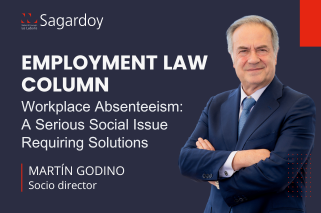The registration of the Equality Plan is of significant importance for companies subject to this obligation. First and foremost, because through it, they formalize their commitment to essential principles such as gender equality. However, the registration of the Equality Plan also carries other critical implications.
Law 9/2017 on Public Sector Contracts, as amended by the Second Final Provision of Organic Law 2/2024 of August 1, on gender parity and balanced representation of women and men, expressly establishes in the first paragraph of letter (d), section 1 of Article 71, a prohibition to contract with public entities:
“… in the case of companies with 50 or more employees, failure to comply with the obligation to have an Equality Plan in accordance with the provisions of Article 45 of Organic Law 3/2007, of March 22, on effective equality between women and men, and to register it in the corresponding labor registry.”
Furthermore, the absence of such registration entails that the Equality Plan will be considered non-existent, which constitutes a very serious labor infringement under Article 8.17 of the Law on Labor Infractions and Sanctions (LISOS).
In short, the registration of the Equality Plan has become a matter of survival for many companies. Some of these do not have legally established employee representation and must therefore follow the procedure outlined in Article 5.3 of Royal Decree 901/2020, of October 13, which governs Equality Plans and their registration.
Said provision requires reaching an agreement with the social counterpart, which in this context is a negotiating commission formed by “the most representative trade unions and the representative trade unions in the sector to which the company belongs, with the legitimacy to be part of the negotiating body of the applicable collective agreement.”
However, the most representative trade unions are facing an obligation/power that demands human resources for which no public funding has been allocated by the Administration, leaving the responsibility entirely on the internal resources of trade union organizations. These unions are thus compelled to handle a new regulatory duty without the necessary financial support. This situation has led to a certain paralysis in union response and, as a result, to a tense waiting period for many companies, who are not merely facing the lack of agreement but the complete absence of initiation of the negotiation process—a procedure that, in some cases, is essential for their continued operation.
The Supreme Court Judgment of April 11, 2024 (No. 545/2024), while upholding well-established case law affirming the essential requirement of an agreement for the approval of the Equality Plan, allowed for an exception. It ruled that, in exceptional circumstances—such as a prolonged negotiation deadlock due to the absence of employee representatives and repeated non-responses by unions over a period of one year and nine months, with more than ten emails requesting negotiations—“the lack of agreement should not prevent registration of the Equality Plan (PIE).”
However, the recent Supreme Court Judgment No. 388/2025 of May 7 has reopened the debate by rejecting that such exceptional circumstances existed in a case where unions simply failed to respond within a 10-day period, thus concluding there was no true negotiation deadlock.
When, then, can we consider a negotiation deadlock to be exceptional? How can it be duly evidenced?
The requirements for evidence appear, to some extent, clarified: Judgment No. 545/2024 accepts that non-response to emails over an extended period may serve as valid proof. The real challenge lies in determining the exact number of contact attempts and the time period necessary to demonstrate that the company has made every effort to fulfill its negotiation obligation.
A clear and specific answer to this question is crucial, as continued legal uncertainty is unsustainable. While the final answer lies with the legislator and the broader framework of Social Dialogue, for now, it is the responsibility of the Administration to either reach consensus or establish clear, reliable criteria that offer companies sufficient legal certainty.



